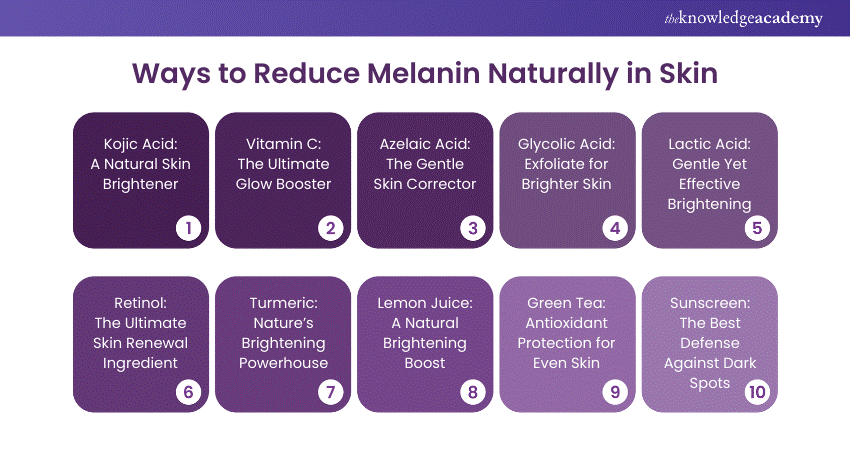We may not have the course you’re looking for. If you enquire or give us a call on 01344203999 and speak to our training experts, we may still be able to help with your training requirements.
We ensure quality, budget-alignment, and timely delivery by our expert instructors.

Achieving a brighter, even-toned complexion is a common goal, but excess pigmentation can make it challenging. Melanin, the skin's natural pigment, protects against Ultraviolet (UV) damage, yet its overproduction can cause dark spots, hyperpigmentation, and uneven skin tone. If you’re wondering How to Reduce Melanin in Skin, there are effective, natural ways to regulate its levels and achieve a radiant, balanced complexion.
In this blog, we explore How to Reduce Melanin in Skin naturally with skincare ingredients, expert tips, and lifestyle adjustments for a clearer, even-toned complexion. Ready to uncover the secrets to radiant skin? Let’s get started!
Table of Contents
1) What is Melanin?
2) Ways to Reduce Melanin Naturally in Skin
3) Effective Tips for Managing Melanin in Your Skin
4) Causes of High Melanin Levels
5) What Should You Have First Thing in the Morning?
6) Does Drinking Water Reduce Melanin?
7) Conclusion
What is Melanin?
Melanin is a natural pigment responsible for the colour of skin, hair, and eyes in humans and animals. It is produced by specialised skin cells called melanocytes, which are located in the epidermis. Melanin plays a vital role in protecting the skin from harmful ultraviolet radiation by absorbing and dispersing sunlight to minimise damage.
Melanin production is a complex biological process influenced by genetic and environmental factors. There are three primary types of melanin: eumelanin (which gives brown and black hues), pheomelanin (which contributes to red and yellow tones), and neuromelanin (found in the brain). The balance of these types defines skin tone and protects against UV damage, ageing, and skin cancers.
For example, people with higher levels of eumelanin tend to have darker skin, which provides better natural protection against harmful UV rays compared to those with lower melanin levels. However, excessive melanin production can result in hyperpigmentation, leading to dark spots, melasma, freckles, and an uneven complexion. Maintaining a balanced melanin level is essential for healthy, even-toned skin.
Ways to Reduce Melanin Naturally in Skin
Here are some natural ways to Reduce Melanin in Your Skin:

Kojic Acid: A Natural Skin Brightener
Kojic acid, derived from fungi, is known for its skin-brightening abilities. It works by blocking tyrosinase, the enzyme behind melanin production, helping to fade dark spots and even out skin tone. Regular use can enhance your complexion, but since some may experience sensitivity, a patch test is always a good idea!
Vitamin C: The Ultimate Glow Booster
Vitamin C isn’t just great for your health—it’s a powerful skin brightener too! It helps inhibit melanin production, reducing dark spots and giving your skin a radiant glow. Plus, it fights free radicals and boosts collagen for a smoother complexion. Just remember to pair it with sunscreen for the best results!
Azelaic Acid: The Gentle Skin Corrector
Azelaic acid, found in grains like barley and wheat, helps reduce melanin production and fade hyperpigmentation. It’s gentle on the skin, making it ideal for tackling dark spots, melasma, and acne scars. Regular use can lead to a clearer, more even skin tone, and the best part? It’s suitable for most skin types!
Glycolic Acid: Exfoliate for Brighter Skin
Glycolic acid, a powerful AHA, works by exfoliating dead skin cells, revealing a fresher, more radiant complexion. It helps fade pigmentation and improves skin texture, making it a great addition to a brightening routine. Since it can increase sun sensitivity, don’t forget to apply sunscreen daily!
Lactic Acid: Gentle Yet Effective Brightening
Lactic acid, a mild AHA, helps gently exfoliate and lighten pigmentation, making it perfect for those with sensitive skin. It smooths texture, evens out tone, and adds a healthy glow. If you’re looking for a brightening boost without irritation, lactic acid is a great choice!
Retinol: The Ultimate Skin Renewal Ingredient
Retinol, a form of vitamin A, speeds up cell turnover, helping to fade dark spots and even out skin tone over time. It also boosts collagen, keeping skin smooth and youthful. Since it can cause sensitivity, start slow and always use sunscreen to protect your skin!
Turmeric: Nature’s Brightening Powerhouse
Turmeric contains curcumin, a natural compound that reduces melanin production and soothes the skin. It’s great for fading dark spots and brightening the complexion. However, it can temporarily stain the skin, so use it sparingly and rinse thoroughly!
Stay active, feel great, and embrace a healthier lifestyle with Active And Healthy Lifestyles Training today!
Lemon Juice: A Natural Brightening Boost
Lemon juice is rich in citric acid and vitamin C, helping to lighten dark spots and exfoliate the skin. However, it’s highly acidic and can cause irritation or increase sun sensitivity. If using it, dilute it first and always wear sunscreen!
Green Tea: Antioxidant Protection for Even Skin
Green tea is packed with epigallocatechin gallate (EGCG), an antioxidant that helps reduce pigmentation and soothe inflammation. It also protects against UV damage, making it a great natural remedy for maintaining an even skin tone. Drink it or apply it topically for a skin-loving boost!

Sunscreen: The Best Defense Against Dark Spots
Sun exposure triggers melanin production, leading to dark spots and uneven skin tone. Using a broad-spectrum SPF 30+ sunscreen daily prevents pigmentation from worsening. Apply generously, reapply every two hours, and keep your skin protected for long-term radiance!
Aloe Vera Gel: Hydration and Brightening in One
Aloe vera contains aloesin, a compound that helps reduce melanin production while soothing and hydrating the skin. It’s a great natural remedy for calming irritation and fading dark spots. Apply regularly for a refreshed, even-toned complexion!
Transform your daily habits, embrace wellness, and build a healthier, happier you with our Healthy Lifestyles Training today!
Effective Tips for Managing Melanin in Your Skin
Here are some essential tactics to Manage Melanin in Your Skin:
Be Consistent
Consistency is key when it comes to skincare. Stick to a regular routine that includes cleansing, moisturising, and applying sunscreen daily. This helps maintain balanced melanin levels and promotes healthy skin.
Consult a Dermatologist
A dermatologist can provide personalised advice and treatments tailored to your skin type and concerns. They can recommend products and procedures to manage melanin production effectively.
Limit Sun Exposure
Protect your skin from excessive sun exposure by wearing protective clothing, seeking shade, and using broad-spectrum sunscreen with at least SPF 30. This helps prevent UV-induced melanin production and reduces the risk of hyperpigmentation.
Choose Skincare Products Wisely
Opt for skincare products that contain ingredients known to regulate melanin production, such as vitamin C, niacinamide, and retinoids. Avoid products with harsh chemicals that can irritate the skin and exacerbate pigmentation issues.
Master the science of nutrition and exercise for a healthier, stronger you by signing up for our Nutrition And Fitness Training – join today!
Causes of High Melanin Levels
High melanin levels can be influenced by several factors, including:
1) Genetics:
Your genetic makeup plays a significant role in determining the amount of melanin your body produces. If your parents have higher melanin levels, you are likely to have similar levels.
2) Sun Exposure:
Prolonged exposure to the sun stimulates melanin production as a natural defence mechanism against UV radiation. This can lead to tanning or darkening of the skin.
3) Hormonal Changes:
Hormonal fluctuations, such as those during pregnancy or due to certain medical conditions, can increase melanin production. For example, melasma, a condition characterised by dark patches on the skin, is often triggered by hormonal changes.
4) Medical Conditions:
Certain medical conditions can lead to increased melanin production. Addison's disease, for instance, causes the adrenal glands to produce insufficient hormones, leading to hyperpigmentation. Hemochromatosis, a condition where the body absorbs too much iron, can also cause skin darkening.
5) Inflammation and Skin Injuries:
Inflammatory conditions like acne or eczema, as well as skin injuries, can lead to post-inflammatory hyperpigmentation, where the affected area becomes darker.
6) Medications:
Some medications can increase melanin production as a side effect. For example, certain chemotherapy drugs and antimalarial medications can cause hyperpigmentation.
What Should You Have First Thing in the Morning?
Starting your day with warm lemon water, green tea, or antioxidant-rich juices can help detoxify the skin and support a healthy glow. Hydration, along with Vitamin C and other skin-nourishing nutrients, helps regulate melanin production and maintain skin health.
Does Drinking Water Reduce Melanin?
While drinking water doesn’t directly reduce melanin, it helps flush out toxins, improve skin hydration, and support cell regeneration. Proper hydration enhances overall skin health, making it look brighter and more radiant, but for melanin reduction, skincare and sun protection are essential.
Conclusion
Knowing How to Reduce Melanin in Skin is key to achieving a radiant, even complexion. By incorporating brightening ingredients, sun protection, and a consistent skincare routine, you can effectively manage pigmentation. With the right care and patience, you can maintain healthy, balanced, and naturally glowing skin.
Unlock the secrets of balanced eating and fuel your body for peak performance with our Nutrition Course today!
Frequently Asked Questions
How is Melanin Produced?

Melanin is produced by melanocytes, specialised skin cells located in the epidermis. The process, called melanogenesis, is triggered by the enzyme tyrosinase, which converts tyrosine into melanin. Factors like genetics, sun exposure, and hormones influence melanin production, affecting skin pigmentation.
Which Vitamin Helps to Reduce Melanin?

Vitamin C helps reduce melanin by inhibiting tyrosinase, the enzyme responsible for melanin production. It also acts as a powerful antioxidant, protecting skin from oxidative stress and UV damage. Regular intake of Vitamin C-rich foods or topical application can promote a brighter complexion.
What are the Other Resources and Offers Provided by The Knowledge Academy?

The Knowledge Academy takes global learning to new heights, offering over 3,000 online courses across 490+ locations in 190+ countries. This expansive reach ensures accessibility and convenience for learners worldwide.
Alongside our diverse online course catalogue, encompassing 19 major categories, we go the extra mile by providing a plethora of free educational Online Resources like News updates, Blogs, videos, webinars, and interview questions. Tailoring learning experiences further, professionals can maximise value with customisable Course Bundles of TKA.
What is The Knowledge Pass, and How Does it Work?

The Knowledge Academy’s Knowledge Pass, a prepaid voucher, adds another layer of flexibility, allowing course bookings over a 12-month period. Join us on a journey where education knows no bounds.
What are the Related Courses and Blogs Provided by The Knowledge Academy?

The Knowledge Academy offers various Healthy Lifestyles Training, including Nutrition Course, Active and Healthy Lifestyles Training, Meditation Course and many more. These courses cater to different skill levels, providing comprehensive insights into How to Stop Overthinking.
Our Health & Safety Blogs cover a range of topics related to Skin Care, offering valuable resources, best practices, and industry insights. Whether you are a beginner or looking to advance your Health & Safety skills, The Knowledge Academy's diverse courses and informative blogs have got you covered.
Upcoming Health & Safety Resources Batches & Dates
Date
 Nutrition Course
Nutrition Course
Fri 25th Apr 2025
Fri 20th Jun 2025
Fri 22nd Aug 2025
Fri 17th Oct 2025
Fri 19th Dec 2025






 Top Rated Course
Top Rated Course



 If you wish to make any changes to your course, please
If you wish to make any changes to your course, please


